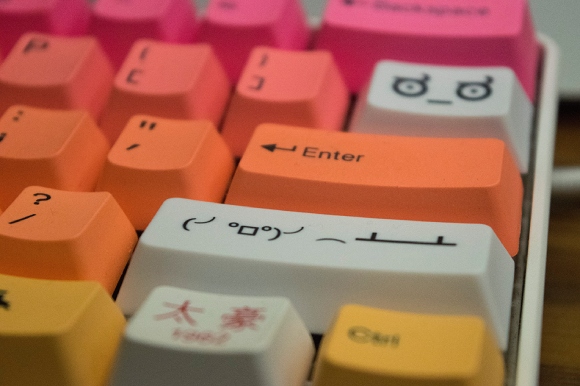One company that succeeds at boosting its reputation through community hearsay, is WASD Keyboards. Their transparent and accommodating customer approach seems to be unrivaled in the market of custom mechanical computer keyboards. Let’s have a closer look.
I am making so much noise writing this article. An echoey clickety-clack is bouncing off the walls.
I just purchased my first mechanical keyboard.
Each one of my keystrokes pushes down a supporting blue switch, the clickiest kind in a range of color-categorized switches. Because of its tactile feedback, keyboards with blue (or brown) switches are favorite among writers. Or so I read.

At the start of my search for a premium keyboard, I got sucked into a world that I was not prepared for. Cherry MX, Topre, tenkeyless, PBT keycaps, double-shot lettering, o-ring dampeners, dip switches. I quickly learned that ordering a mechanical keyboard wasn’t going to be as simple as pointing at it and saying: “That color, please!”
Luckily, whenever curiosity or passion meets complexity, there is always a community nearby, full of people willing to help and inspire one another. The online community of mechanical keyboard enthusiasts is no different.
When it comes to customer support, one manufacturer of mechanical keyboards is mentioned the most in the community: WASD Keyboards. Being on my geeky search, I obviously had to learn more about this vendor.
Ever since its inception in 2011, California-based company WASD Keyboards has aimed to sell mechanical keyboards that are easy to customize. Pick a size, base color, switch type, each individual keycap’s color and lettering, and have your one of a kind keyboard assembled and shipped to your doorstep. That is, if you are willing to spend at least 140 bucks.

Aside from WASD’s cleverly exploited market niche, the manufacturer sets itself apart even more by offering excellent customer service. After spending hours comparing mechanical keyboards online, I started to notice that no company is publicly endorsed by customers for after-sales support as much as WASD. I thought to myself: here you have the perfect example of an open community engaging in favor of a company’s reputation.
What is driving WASD’s success? My assessment is that the company consciously climbed the ladder of goodwill.
WASD began by ensuring that their product always meets the highest standards – from the ordering process to receiving the actual hardware. The keyboard assembler seemed to understand that next-level customer support, community building and clever marketing comes after getting your base product right.
On the foundation of base product quality, WASD added a layer of exceptional customer care. “Need help? Have some feedback? We are on it!” The reassurance that comes with an approachable and responsive company makes it more likely for customers to revisit.
The third tier of customer experience took shape when WASD enabled people to broadcast their thoughts and ideas. On the company’s community website product development can be freely discussed, for everyone to see. Unfortunately, at this moment, the number of public conversation topics is a bit low, and depth of conversation is found wanting. WASD could improve upon this by applying a more engaging, inquisitive community management style.
Maker Designs is probably the most visible example of WASD’s efforts to collaborate with customers. It lets creative individuals submit their custom keyboard designs to be shared with other customers. When WASD sells a keyboard with one of these pre-made designs, the ‘Maker’ gets a cut. This level of integrated co-creation is rare.
You may wonder how nifty keyboards relate to the line of business you are in, and whether your product could even compete on a scale of desirability. I would argue, though, that any kind of product or service can become the talk of the town.
In fact, the keyboard is a great example of a practical, boring product becoming more fashionable. Ever since the likes of IBM and Apple brought the personal computer into our homes, to most people keyboards have been mere breadcrumb collectors that would only be replaced if they stopped working. Over time, more and more premium keyboard manufacturers have claimed a significant market share, as they discovered new ways to create value for customers.

Therefore, the main takeaway from this article is to ask yourself: are you currently selling the equivalent of a decent IBM keyboard or a modern, community-supported WASD keyboard? And, what would it take to stretch your product to become more exclusive and desirable? Share your train of thoughts in the comments below.
By the way, I am not sponsored by WASD Keyboards, or any other company for that matter. Actually, after long deliberation, I ended up buying a Korean Leopold FC660M with a 65% layout, Cherry MX blue switches and PBT double-shot keycaps. We seem to click.
